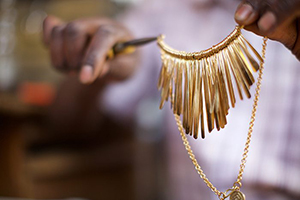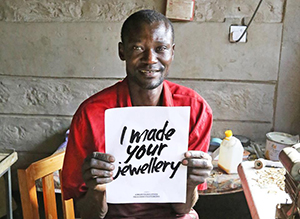Building a Supply Chain for Ethical Jewelry
-
-
slice.mit.edu
Filed Under
Recommended

Ella Peinovich MArch ’12 first visited Africa to design low-cost toilet infrastructure in Kenya’s slums while earning her master’s degree in architecture. She ended up moving back after graduation and hasn’t left.
After bringing back suitcases of jewelry for family and friends in the US, she soon realized she should give customers direct access to these skilled artisans. Peinovich founded ethical jewelry company Soko in 2012 along with two other women she met in Nairobi. Although the company is headquartered between San Francisco and Nairobi, Peinovich remains in Nairobi.
“What I really enjoy about living in East Africa is the access to the rich culture and heritage at our fingertips,” says Peinovich. “It is a continual source of inspiration. There are so many amazing experiences that still spark our curiosity about this continent. You get to learn so much about yourself in these really unique environments.”
What drew Peinovich to Nairobi was the culture, and what has kept her is the opportunity. “I saw there was a business opportunity to work in a sustainable way to help artisans and revolutionize the global fashion supply chain,” says Peinovich. And she has done just that.
The company connects global consumers to entrepreneurs in Africa using supply chain innovation and mobile tools, and that provides opportunities to around 2,500 marginalized artisans—who can make up to four times their normal earnings through Soko, generating more than $750,000 in 2017 alone. “My interest was in creating a platform for artisans to post their works online, similar to an Etsy or Amazon, but bridging geography, economic, and technological barriers,” says Peinovich.
In addition to selling via their own online platform, Soko jewelry is available at more than 400 retailers in over 45 countries, including Nordstrom and Anthropologie, and they even opened their own storefront in 2016. Soko, a partner with the United Nations Trust Fund, is passionate about promoting ethical fashion, transparency, and conscious consumerism—often posting photos of the artisans that make the jewelry on social media channels.
"Soko is driven by a passion for our purpose of empowering marginalized communities," says Peinovich. "Our commercial success is lead by a great quality product that meets the price and volumes of today's fashion consumer, and our scalable business model is driven by a differentiated supply chain solution that leverages innovative technology to create a distributed manufacturing model suited for the continent of Africa."
Though she studied architecture, Peinovich says there is a lot of overlap with what she is doing now. “My architecture thesis work was focused around developing sustainable methodologies of construction using computer-aided design and manufacturing,” says Peinovich. “I would definitely say that that translates to capacity building with the artisans. We help the artisans think through master specifications; in other words, taking that one beautiful master product and helping the artisans to negotiate how they can produce this at a scaled volume while maintaining the quality.”









